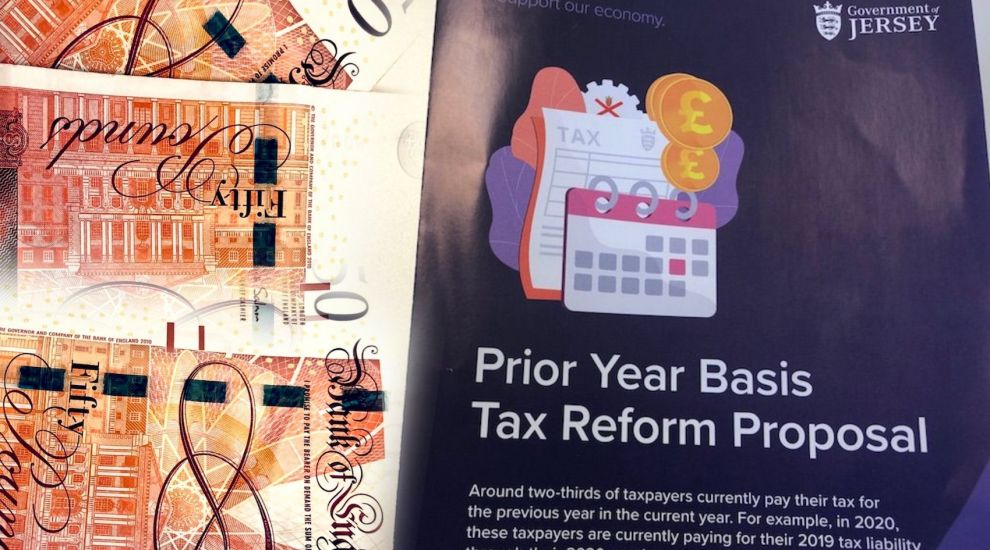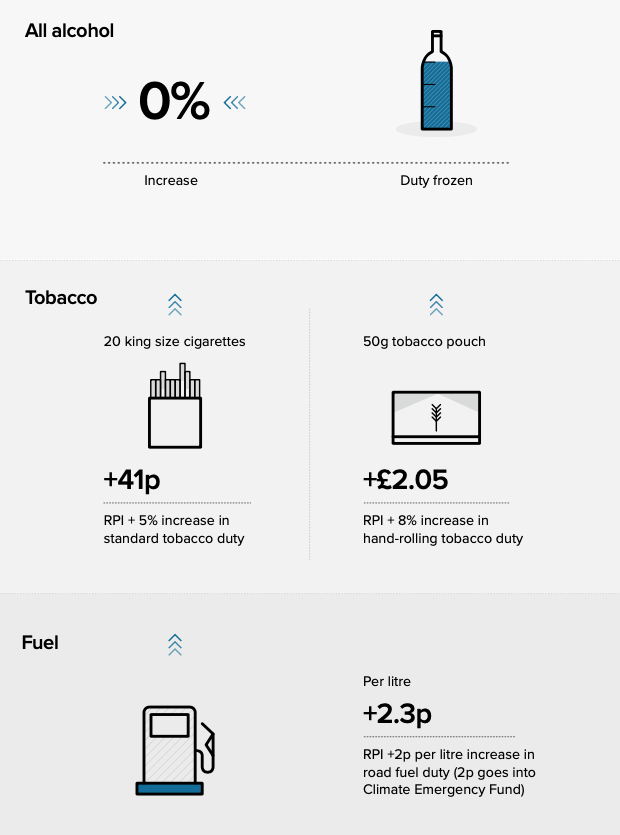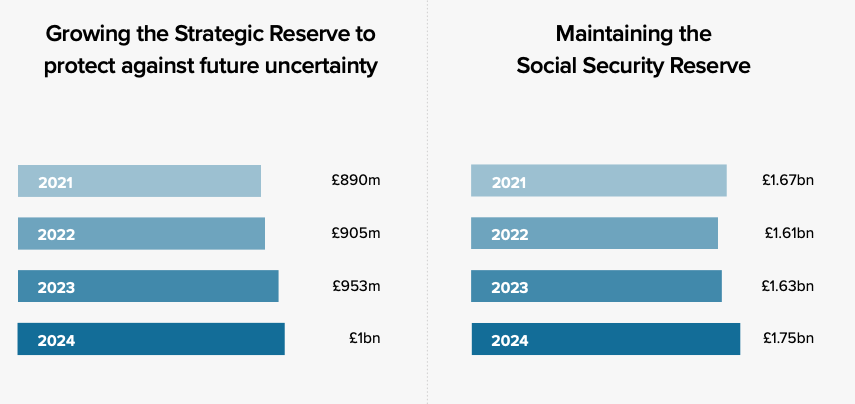


The Government plans to keep the tax of those paying a year in arrears to pay for the public debt incurred tackling the covid pandemic.
Announcing the Government Plan for 2021-2024 yesterday, Chief Minister Senator John Le Fondré said that ring-fencing the entire 2019 tax of the two-thirds of taxpayers still contributing on a ‘prior year basis’, estimated to be around £330m, would pay for the lion’s share of the £336m of borrowing that the Treasury will be forced to take next year because of the crisis.
Taxpayers who move from prior year to ‘current year basis’ will be offered a range of options to pay their 2019 liability from 2025, including over ten years.
This group is predominately long-term, locally qualified taxpayers.
However, that is contingent on the States Assembly approving the Government’s plan to move everyone over to paying their tax in the year it is due. Members are due to debate the proposal in December. If they reject it, as the 5,645 islanders who have signed an official petition want them to, the Government will have to find another way to pay off its debts.
Pictured: The Government Plan was published on Monday.
The Government Plan predicts that, after four years of deficit – when the Government will spend more than it earns - the books will be balanced again by 2024, providing that the island isn’t hit by a new pandemic or another curveball.
However, that doesn’t include the significant sum of money that the Government intends to borrow next year to pay for the new £804m hospital, which it hopes to secure with a fixed-rate medium- to long-term loan.
Senator Le Fondré said: “To cover the costs of responding to the pandemic, ministers are proposing borrowing up to a maximum of £336m next year, in addition to the Fiscal Stimulus Fund of £50m, which will fund short-term projects which provide a boost to the economy.
“But if the States agree to move all taxpayers to the same year, although covid-19 has caused some financial challenges, the direct financial cost can be offset without a permanent increase in taxation, consistent with the long-term thinking and prudent approach that Jersey is renowned for.”
Other main points of the Government Plan include:
The spending impact of the pandemic from 2020 to 2024, including economic recovery and fiscal stimulus, is estimated at more than £400m, with £40m set aside to cover the costs associated with dealing with potential future cases in the island.
The income impact of the pandemic has seen the forecast for general revenues for 2020-2023 fall by £395m since last year’s 2020-23 Government Plan was approved.
In addition to the investment in the pandemic response, the Government proposes further investment of £62 million per year by 2024 in its strategic priorities, which includes education and healthcare.

Pictured: The Government's investing plan.
The Government has ruled out raising GST or changing the 0/10 tax system to bring in extra revenue; however, it will raise some business fees and propose above-inflation increases in road-fuel and tobacco duty. It also wants to ‘widen the tax base’ by bringing more businesses currently paying no corporate tax into the 10% band.

Pictured: How duty and taxes will rise in 2021 if the Government Plan is passed.
It also plans to tax the growing and processing of medicinal cannabis and potentially increase residential and commercial stamp duty on property sales. It hopes to increase its tax take by £10m a year by 2024.
Revenue is expected to fall by £96m this year alone, followed by £115m in 2021, £99m in 2022 and £85m in 2023. The Government expect a £275m deficit this year, £175m in 2021, £50m in 2022 before returning small £10m surpluses in 2023 and 2024.
The Government will borrow £385m next year to cover the cost of the pandemic. This will be taken from its £500m ‘revolving credit facility’ – a variation of an overdraft – which was obtained in May.
Spending will hit £1bn this year, falling to £985m next year, £914m in 2022, £902m in 2023, and rising to £952m in 2024.
As Express reported today, the Government will be introducing an efficiencies programme worth £120m – the ‘rebalancing plan’ – to help plug the deficit. It has pledged to deliver £40m in 2020, made up of £28m of recurring savings and £12m in “one-off” measures. Nearly every Ministerial department has been set a savings target to reach a goal of £20m in 2021, with Health facing the biggest of £5m and Infrastructure coming in second with £4.5m.
The Government has been advised by its panel of economic advisers to borrow rather than dip into reserves. It plans to increase the Strategic Reserve – the ‘Rainy Day Fund’ – from £890m to £1bn by 2024. This, it says, not only protects against future uncertainty but gives assurance to potential lenders and helps maintain the Island’s credit rating.

Pictured: How the Government will maintain its biggest reserves.
The Social Security Fund will also be protected, with its value projected to increase from £1.67bn to £1.75bn by 2024. This is seven-times its annual outlay. However, the Government will stop paying in its annual taxpayer contribution into the fund over the four years of the plan, worth £235m over the four years of the plan. Instead, the fund will be topped up out of the Social Security Reserve Fund in order to maintain the regular pension and benefit payments. That freed-up £235m will be spent on other projects.
In future, the Government hope to cap this annual contribution to £65.3m from 2024, when it will hold six years of fund expenditure.
In another example of dipping into existing pots of money, ministers plan to withdraw £28m from the Health Insurance Fund and £16m from the Health Digital Strategy. This £44m raid on reserves will help fund the implementation of the Jersey Care Model, which will mean more healthcare provided in the home and community and less in hospital.
And moving more financial chess pieces around the board, £11.3m will be transferred from the Health Insurance Fund at Social Security to support the Jersey Care Model and the Health Digital Strategy costs budgeted for next year.
Forecasts for economic recovery are bleak. The official forecast from the Government’s economic advisers is for a severe recession this year, with a fall in economic output of 7.5% and a fall in employment of 1.6%. That forecast assumes that the economy will recover through the second half of 2020 and 2021, although at a relatively subdued pace. It also includes a judgement that the global pandemic and recession will permanently affect the economy, with not all the lost ground in output made up.
On the spending side, the Government expect to spend more than £250m on dealing with the pandemic by the end of this year. Next year, it plans to spend £87m, and set aside £40m in cases spike next winter.
Next year, it also intends to spend £41m on initiatives that support its strategic priorities, and more than £371m on infrastructure and technology over the four years of the plan.
When it comes to its capital plan, the Government is considering building a new £17m Victoria College Prep and a home for the Jersey Instrumental Music Service Premises, extending La Moye School and updating several sporting facilities.
Pictured: The plan earmarks £17m for a new VCP.
In 2021, the Government want to establish an Infrastructure Fund to attract private sector investment in long-term projects. This could be anything from building an offshore wind farm or tidal barrage to homes and amenities. It also wants to explore financing its pension debt, bringing in environmental taxes and charges, and finding the money to protect the Island from rising sea levels.
The Government hasn’t forgotten about other major items on its ‘to-do’ list, including Brexit, the new hospital, Fort Regent, a migration policy and finding a new headquarters. These, it says, will be the subject of future briefings.
The full Government Plan isn't set in stone, however, and States Members will be able to bring amendments to it ahead of a vote on whether to approve it in December.
Follow Express this week for more analysis...
Comments
Comments on this story express the views of the commentator only, not Bailiwick Publishing. We are unable to guarantee the accuracy of any of those comments.